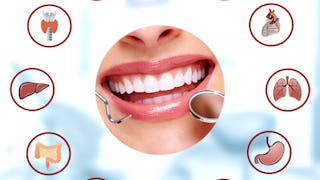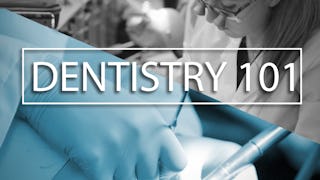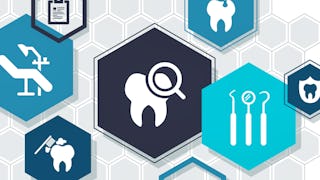The mouth is the window into human health. This course provides an overview of dental medicine to engage, educate, excite and assist you in improving the oral health of your patients and members of your community. We will review topics in dental medicine including scope of the field, what to expect in function, and some of the many ways that dysfunction may present for different patients. This will include discussions of mouth, jaw, and tooth anatomy, pathology, and treatment. We will talk about differences between patients and the unique roles that different members of the dental field may play in treatment depending on the patient and condition. This course starts from basic concepts and proceeds to review trends in current research and technology. We offer scientific background, some skills for patient evaluation and interview, and some suggestions for further learning for those interested in or involved in dental education.

Enjoy unlimited growth with a year of Coursera Plus for $199 (regularly $399). Save now.

Introduction to Dental Medicine
This course is part of The Integration of Art and Science in Modern Dental Medicine Specialization



Instructors: Dr. Uri Hangorsky
70,616 already enrolled
Included with
(1,518 reviews)
Skills you'll gain
Details to know

Add to your LinkedIn profile
8 assignments
See how employees at top companies are mastering in-demand skills

Build your subject-matter expertise
- Learn new concepts from industry experts
- Gain a foundational understanding of a subject or tool
- Develop job-relevant skills with hands-on projects
- Earn a shareable career certificate

There are 7 modules in this course
In this course, you will learn about basic dental anatomy, how to evaluate a patient, and the causes and impact of oral diseases. We will use case examples and live demonstrations with patients to illustrate these points. Please note that some lectures in this course contain graphic medical images, including illustrations of the human body, oral cavity, early development, and photographs of medical conditions and deformities. Discretion is advised. The materials in this course are intended for education purposes only and are not intended to serve as professional medical advice, diagnosis, or treatment. Please seek the advice of your dentist, physician, or other qualified health professional if you have any questions related to this material and its relevance to your health or that of someone else. Week 1 is your introduction to dental medicine! This includes oral health's relation to general health, sources of infection, modern technology in dentistry, and the public health impact of dental medicine. Let's get started!
What's included
8 videos1 assignment
The modules in week 2 describe basic dental anatomy including embryology of the oral cavity, oral functions, basic tooth structure, and clinical implications of disease. Emphasis is placed on the clinical implications of these concepts and structures.
What's included
4 videos1 assignment
These modules will demonstrate the evaluation of extra- and intraoral structures. They also review the taking of a thorough medical history, with live patient demonstrations. This unit emphasizes the complex relationship between the systemic and oral health.
What's included
8 videos1 assignment
Diseases affecting the dentition and its surrounding structures have a profound influence on the patient and his/her health. Untreated conditions can result in severe pain, localized, and systemic infections and result in partial or complete loss of teeth.The etiology and the contributing factors to these diseases are discussed in detail.
What's included
4 videos1 assignment
Possible oral and mucosal conditions include anomalies, ulcers, cancer and associated diseases. Some of these conditions have localized or idiopathic etiology; others are manifestations of systemic diseases of the body. Many times these oral conditions appear as the initial symptom of a systemic disease. The management of such conditions often involves an interdisciplinary approach to management involving the patient's dentist, physician, and medical specialists.
What's included
3 videos1 assignment
These modules address oral and facial pain from common conditions to rare ones, including an exploration of the psychological aspects of oral and facial pain. Dental pain can originate not only from diseased dentition, but also from various disorders affecting the TMJ, nerves, soft and hard tissue infections and other sources. Dental pain can have underlying psychosocial etiology as well, and the diagnosis in such cases can be challenging.
What's included
10 videos1 assignment
Selected cases in dental medicine ranging from oral surgery to prosthetic reconstruction are discussed in the context of the important role of dental specialists. Each presenter discusses the challenges of focused dental treatment and presents cases with "before" and "after" documentation.
What's included
7 videos2 assignments
Earn a career certificate
Add this credential to your LinkedIn profile, resume, or CV. Share it on social media and in your performance review.
Instructors



Offered by
Explore more from Basic Science
 Status: Free Trial
Status: Free TrialUniversity of Pennsylvania
 Status: Free Trial
Status: Free TrialUniversity of Pennsylvania
 Status: Preview
Status: PreviewUniversity of Michigan
 Status: Preview
Status: PreviewUniversity of Pittsburgh
Why people choose Coursera for their career




Learner reviews
1,518 reviews
- 5 stars
87.62%
- 4 stars
10.40%
- 3 stars
1.38%
- 2 stars
0.26%
- 1 star
0.32%
Showing 3 of 1518
Reviewed on Apr 1, 2020
Thorough knowledge of each and every aspect of dentistry specially how to rule out diagnosis and treatment accordingly.Special focus on orofacial pain and its diagnosis is really appreciable.
Reviewed on Jun 4, 2020
A very thorough course that helped me learn more about the field that I am interested in! It was definitely a little bit difficult at some points but well worth the struggle.
Reviewed on Feb 10, 2017
THE COURSE WAS AWESOME.IT HAS ALL THE NECCESSARY INFORMATION REQUIRED FOR A DENTIST TO REVIEW ALL WHAT HAS BEEN TAUGHT AT DENTAL SCHOOL LEVEL.I THOROUGHLY ENJOYED MY TIME WHILE PURSUING THIS COURSE.
Frequently asked questions
To access the course materials, assignments and to earn a Certificate, you will need to purchase the Certificate experience when you enroll in a course. You can try a Free Trial instead, or apply for Financial Aid. The course may offer 'Full Course, No Certificate' instead. This option lets you see all course materials, submit required assessments, and get a final grade. This also means that you will not be able to purchase a Certificate experience.
When you enroll in the course, you get access to all of the courses in the Specialization, and you earn a certificate when you complete the work. Your electronic Certificate will be added to your Accomplishments page - from there, you can print your Certificate or add it to your LinkedIn profile.
Yes. In select learning programs, you can apply for financial aid or a scholarship if you can’t afford the enrollment fee. If fin aid or scholarship is available for your learning program selection, you’ll find a link to apply on the description page.
More questions
Financial aid available,





